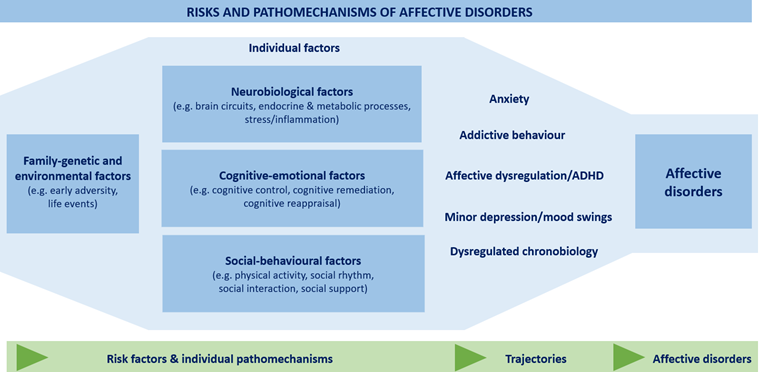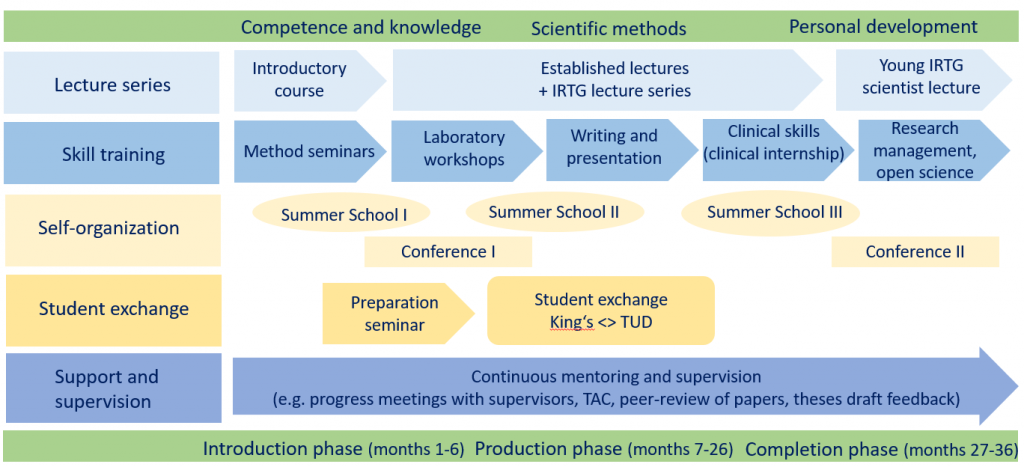Affective disorders are common complex disorders representing one of the greatest challenges to global health in the 21st century. Advances in diagnostic precision and early targeted interventions may provide an opportunity to address the enormous public health burden and individual suffering associated with these disorders. The International Research Training Group (IRTG) 2773 “Risk Factors and Pathomechanisms of Affective Disorders” is designed as an interdisciplinary collaboration that offers a structured International Graduate Programme “Translational Research in Affective Disorders” for a new generation of talented young scientists. The IRTG is funded by Deutsche Forschungsgemeinschaft (DFG) and started July 1st, 2022.
Please see a list of the research projects at the end of this page. If you require more information, please contact irtg2773@ukdd.de.

Multiplicity of Mechanisms: Multilevel – Multimethod Approach
Within the IRTG we aim to provide a foundation for interdisciplinary neuropsychiatric and translational research and training to elaborate and combine research methods and innovative treatment approaches for these disorders. The IRTG is embedded in the environment of the transCampus®, a unique partnership of two excellent European academic institutions – Technische Universität Dresden and King’s College London. Both institutions are leading centres in both basic research and innovative treatment of affective disorders and have pioneered the translation of results from basic science into clinical application. This expertise is combined within the overarching aims of the IRTG to promote our key research goals and multi-method approach in the examination of risk factors and pathomechanisms to improve early identification, understanding and treatment of affective disorders. The IRTG supports the research of 10 MD students in an international environment.
- Investigation of risk factors and pathomechanisms of affective disorders to improve prevention, early identification and treatment
- Further development of the translational approach bringing basic research into clinical application and vice versa
On 5th November 2021 the DFG grants committee reached a positive final decision and approved of funding that started on 1st July 2022. In September 2022 the Dresden students finally met their London PIs and fellow students in person during the kick-off meeting at KCL. After this successful beginning, the transCampus Mental Health team is now doing their utmost to facilitate a new generation of researches to learn and conduct translational clinical and neuroscientific research in an international and multidisciplinary context.
To achieve these goals we adopt in our integrative translational research programme a multi-level/multi-method approach considering neurobiological, cognitive-emotional and social-behavioral information using state-of-the-art epidemiological, neuroscience and clinical approaches. Students of the IRTG acquire experience in different interdisciplinary environments, enhancing their qualification for the future challenges of translational psychiatric research. Embedded in clinician scientist curricular structures, working across two leading research centres and their clinical institutions stimulate basic research and clinical applications and provide various opportunities for translation. Our aims can ideally be accomplished by combining the complementary and interdisciplinary expertise of both transCampus® institutions that provide a productive and interdisciplinary environment for high-level education of young scientists and prepare them for a long-term independent clinical-scientist research career.

Research projects within the IRTG 2773:
- P1: Mapping trajectories & brain correlates of affective symptomatology in animal models (TUD: Nadine Bernhardt – King’s: Anthony Vernon)
- P2: Early risk factors and trajectories of affective disorders: A multimodal approach to developmental epidemiology (TUD: Eva Mennigen, Katja Beesdo-Baum – King’s: Paola Dazzan, Carmine Pariante)
- P3: Early detection of young at-risk individuals for bipolar disorders (TUD: Andrea Pfennig, Julia Martini – King’s: Paolo Fusar-Poli)
- P4: Neural correlates of social cognitive risk factors for depression and bipolar disorder (TUD: Philipp Kanske – King’s: Roland Zahn)
- P5: Learning, motivation, and cognitive control as trans-diagnostic mechanisms in addiction and depression (TUD: Michael Smolka, Thomas Goschke – King’s: Robert Leech)
- P6: Probing the causal role of fronto-temporal networks in self-blame and emotional conflicts using tDCS (TUD: Christian Beste – King’s: Roland Zahn, Katya Rubia)
- P7: The impact of physical activity on hormonal, metabolic, inflammatory mediators and the regulation of affective states (TUD: Stefan Ehrlich, Stefan Bornstein – King’s: Carmine Pariante)
- P8: Towards understanding and enhancement of cognitive function in patients with bipolar disorders (TUD: Philipp Ritter, Clemens Kirschbaum – King’s: Rebecca Strawbridge, Allan H. Young)
- P9: EEG-Neurofeedback and fMRI brain function of novel ADHD treatments in children and adolescents with ADHD and affective dysregulation (TUD: Veit Roessner, Annet Bluschke – King’s: Katya Rubia)
- P10: Early intervention in the prophylactic treatment of bipolar disorder using smartphone-based ambulatory assessment (TUD: Emanuel Severus, Michael Bauer – King’s: Anthony Cleare, Allan H. Young, Sameer Jauhar)


